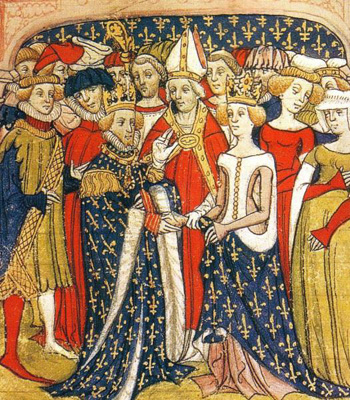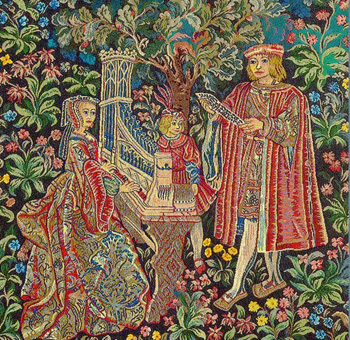Organic Society
 |
 |
 |
 |
 |
 |
 |
Family, Marriage & Sublimity
The role of the family as we studied in the previous articles completely modifies the actual lives of persons, for example, in the matter of marriage.
The way marriage was considered started to change more or less after the French Revolution. It began to be transformed into the drama of a man who is not understood in his own milieu and looks for a unique young woman who has a unique affinity with him. With this ideal woman he dreams to find a unique relationship of harmony and unity of sentiment and thought. Based on this idea, Romanticism was born.
Now then, this almost never occurs with two persons removed from the ambience of families, who are outsiders in the family – even when they live in a family home.
This aspect of life has been completely falsified today by our psychological and moral customs, which lead to the wild sensuality that we see everywhere.
 When we analyze the situation, we see that what is lacking is the support that comes from the moral understanding and affection family members have for one another, which, based on the Catholic Faith, provide them with the same framework of thinking on different matters. The lack of this element causes the modern man to live like a fish outside water, even in a family.
When we analyze the situation, we see that what is lacking is the support that comes from the moral understanding and affection family members have for one another, which, based on the Catholic Faith, provide them with the same framework of thinking on different matters. The lack of this element causes the modern man to live like a fish outside water, even in a family.
The reality that results from an organic society should be understood differently.
We cannot say the family lives isolated in a city. The city is a family of families that have a certain affinity, even when they do not have consanguinity or a very remote consanguinity, which still allows for marriages to be made.
As a starting point there is the union of souls conferred by the Catholic Faith; then, the affective and sentimental homogeneity provided by the family as well as a similarity of ideas. Next, we have the city as a family of families. The life of Family A is completely different from the life of Family B, but at the same time so similar that a group of families dwelling in the same city constitute a family of families.
A young man who looks for a young woman to court in another family finds a girl already prepared to live in the institution of the family, a family that has affinities with his own, even though the two do not know each other well.
Were that young man to go to Birmania, let us say, and find a young woman to marry, the situation would be completely different.
Instead, the two future spouses share an affinity based on a kind of proximity that establishes a way of being, living together and good understanding, which are premises for a good conviviality.
Institutions born from the family
This ambience of congeniality produces a strong cohesion and mutual collaboration, which causes the common need of these groups of families to instinctively generate institutions born from the family - born from this sentiment that nourishes those families.
The guilds and other medieval institutions were born from the family because they were born from that ambience in which the families live and expand.
These institutions cannot be seen as dangerous tentacles of harmful foreign bodies, as in so many modern institutions. They are natural components of the organic life of society.
I think that at a certain moment the Revolution will try to remodel the life of family based on in vitro conception and genetic engineering. This model would be the family planned by technicians who have left the path of God. This would no longer be the family, but a caricature of it, accompanied by the curse of God rather than His blessing.
Fostering love of neighbor
 The Catholic family ambience must have something of a common mystical sense, which favors the correct development of the sentiment we have described. When we enter a house of a well-constituted family, we feel the presence of a collective soul, which is the spirit of that family. It is not a being, but the psychology of that family sheathed in the blessings of God.
The Catholic family ambience must have something of a common mystical sense, which favors the correct development of the sentiment we have described. When we enter a house of a well-constituted family, we feel the presence of a collective soul, which is the spirit of that family. It is not a being, but the psychology of that family sheathed in the blessings of God.
These blessings come from the Sacrament of Marriage, from the natural and holy authority of the parents, from the natural and holy love among the siblings. It is a unique characteristic that no other institution has.
It is difficult for man to move society forward today because he finds it difficult to practice love of neighbor.
The family nurtures the appetite to love one’s neighbor and amicably encourages the accomplishment of this very hard duty. When a society lacks a strong family life, the love of neighbor is weak.
How different society would have developed if royal absolutism had not entered in the Renaissance and Ancien Régime, opening the doors for all types of state interventions and artificial economic plans that dismantled the family? If the institution of the family had not been broken, what could have been born from it? This is a fascinating question to ponder.
Sublimity, an aspiration for the family
The family increases in vitality as it tends toward the sublime. It has a natural sublimity, which should be crowned by the sublimity of Our Lord Jesus Christ.
In a natural family as well as in a family of souls, the members should maintain as much as possible a tonus of seriousness, gravity and love for the sublime. The love for the sublime produces, as a deep but subconscious fruit, the desire to please one another, to be in harmony with the other. When there is no harmony, it is because the love of the sublime is missing.
 The starting point of an authentic social dynamics and social psychology is the love of God, focused on the love for the sublime. When this occurs, a tendency sprouts to seek the sublime aspect of all things and to become the dominant note.
The starting point of an authentic social dynamics and social psychology is the love of God, focused on the love for the sublime. When this occurs, a tendency sprouts to seek the sublime aspect of all things and to become the dominant note.
The highest aspect of sublimity is found in the Sacred Heart of Jesus. Afterwards, we contemplate the sublimity of the father and the mother, the origin of the family. Everything has a sublime principle that corresponds to the grace of Baptism. Well-constituted souls understand these aspects and feel an affinity with others who do the same. From this comes a temperamental disposition to be united to the Church.
A family that has the notion of how a perfect family should be – even when its members know they cannot realize that model – and loves that perfect model ideal ends by seeing the best aspect of its members. That perfect model helps them to rise in everything that is perfectible in their lives.
Something analogous happens in the other spheres of society, since we can imagine different kinds of sublimities. There is, then, the sublimity proper to the family, another to the community, and others to the municipality, the province, the nation, and even to the various areas of culture and civilization.

Posted May 10, 2019
The way marriage was considered started to change more or less after the French Revolution. It began to be transformed into the drama of a man who is not understood in his own milieu and looks for a unique young woman who has a unique affinity with him. With this ideal woman he dreams to find a unique relationship of harmony and unity of sentiment and thought. Based on this idea, Romanticism was born.
Now then, this almost never occurs with two persons removed from the ambience of families, who are outsiders in the family – even when they live in a family home.
This aspect of life has been completely falsified today by our psychological and moral customs, which lead to the wild sensuality that we see everywhere.

In a Catholic marriage the spouses have the same background of Faith and formation
The reality that results from an organic society should be understood differently.
We cannot say the family lives isolated in a city. The city is a family of families that have a certain affinity, even when they do not have consanguinity or a very remote consanguinity, which still allows for marriages to be made.
As a starting point there is the union of souls conferred by the Catholic Faith; then, the affective and sentimental homogeneity provided by the family as well as a similarity of ideas. Next, we have the city as a family of families. The life of Family A is completely different from the life of Family B, but at the same time so similar that a group of families dwelling in the same city constitute a family of families.
A young man who looks for a young woman to court in another family finds a girl already prepared to live in the institution of the family, a family that has affinities with his own, even though the two do not know each other well.
Were that young man to go to Birmania, let us say, and find a young woman to marry, the situation would be completely different.
Instead, the two future spouses share an affinity based on a kind of proximity that establishes a way of being, living together and good understanding, which are premises for a good conviviality.
Institutions born from the family
This ambience of congeniality produces a strong cohesion and mutual collaboration, which causes the common need of these groups of families to instinctively generate institutions born from the family - born from this sentiment that nourishes those families.
The guilds and other medieval institutions were born from the family because they were born from that ambience in which the families live and expand.
These institutions cannot be seen as dangerous tentacles of harmful foreign bodies, as in so many modern institutions. They are natural components of the organic life of society.
I think that at a certain moment the Revolution will try to remodel the life of family based on in vitro conception and genetic engineering. This model would be the family planned by technicians who have left the path of God. This would no longer be the family, but a caricature of it, accompanied by the curse of God rather than His blessing.
Fostering love of neighbor

Family’s blessings come from the Sacrament, the parents’ authority & the love among siblings
These blessings come from the Sacrament of Marriage, from the natural and holy authority of the parents, from the natural and holy love among the siblings. It is a unique characteristic that no other institution has.
It is difficult for man to move society forward today because he finds it difficult to practice love of neighbor.
The family nurtures the appetite to love one’s neighbor and amicably encourages the accomplishment of this very hard duty. When a society lacks a strong family life, the love of neighbor is weak.
How different society would have developed if royal absolutism had not entered in the Renaissance and Ancien Régime, opening the doors for all types of state interventions and artificial economic plans that dismantled the family? If the institution of the family had not been broken, what could have been born from it? This is a fascinating question to ponder.
Sublimity, an aspiration for the family
The family increases in vitality as it tends toward the sublime. It has a natural sublimity, which should be crowned by the sublimity of Our Lord Jesus Christ.
In a natural family as well as in a family of souls, the members should maintain as much as possible a tonus of seriousness, gravity and love for the sublime. The love for the sublime produces, as a deep but subconscious fruit, the desire to please one another, to be in harmony with the other. When there is no harmony, it is because the love of the sublime is missing.

The natural sublimity of the family life should reflect the supernatural sublimity of Our Lord
The highest aspect of sublimity is found in the Sacred Heart of Jesus. Afterwards, we contemplate the sublimity of the father and the mother, the origin of the family. Everything has a sublime principle that corresponds to the grace of Baptism. Well-constituted souls understand these aspects and feel an affinity with others who do the same. From this comes a temperamental disposition to be united to the Church.
A family that has the notion of how a perfect family should be – even when its members know they cannot realize that model – and loves that perfect model ideal ends by seeing the best aspect of its members. That perfect model helps them to rise in everything that is perfectible in their lives.
Something analogous happens in the other spheres of society, since we can imagine different kinds of sublimities. There is, then, the sublimity proper to the family, another to the community, and others to the municipality, the province, the nation, and even to the various areas of culture and civilization.

Posted May 10, 2019
Organic Society was a theme dear to the late Prof. Plinio Corrêa de Oliveira. He addressed this topic on countless occasions during his life - at times in lectures for the formation of his disciples, at times in meetings with friends who gathered to study the social aspects and history of Christendom, at times just in passing.
Prof. Plinio
Atila S. Guimarães selected excerpts of these lectures and conversations from the transcripts of tapes and his own personal notes. He translated and adapted them into articles for the TIA website. In these texts fidelity to the original ideas and words is kept as much as possible.
______________________
______________________






